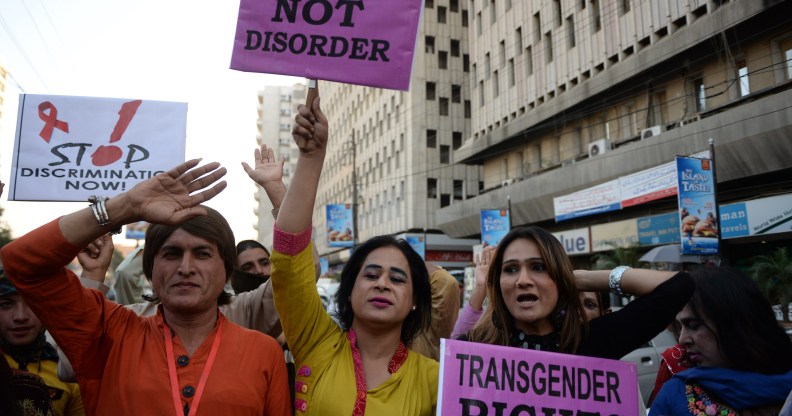Pakistan takes serious steps towards ending discrimination by extending free healthcare to trans people

Placards at a rally to mark World Aids Day in Karachi on November 30, 2013. (ASIF HASSAN/AFP via Getty Images)
Pakistan has extended free healthcare to transgender citizens for the first time, in a move that will help lessen discrimination against trans people.
All trans people in Pakistan will now be eligible for free medical treatment, including transition-related care.
The government is giving trans people a special health card that will give them access to an existing government health insurance scheme, which was introduced in 2015 to provide health cards for those earning less than $2 a day, although trans people will not face that financial test.
Prime minister Imran Khan said that his government was “taking responsibility” for trans people, who say they are routinely denied treatment and can face harassment or ridicule from hospital staff and patients.
This is despite the fact gay sex and same-sex activity is illegal under Pakistani law.
The government also plans to set up separate hospital wards for trans patients, according to Dr Zafar Mirza, a special aide to Khan for health services.
“It is part of a grand programme to provide health insurance not just to the poor but the vulnerable sections of society, including … transgender (people),” said Mirza.
“Any person who identifies as transgender is eligible for this health insurance programme,” he told the Thomson Reuters Foundation.
Trans people have historically faced severe discrimination in healthcare settings, with doctors denying trans people treatment when they could not decide whether to treat them in a male or female ward.
The health ID cards giving access to the free healthcare scheme will be immediately available, but only to trans people who have registered as trans on their other identity documents.
Pakistan officially recognised transgender people in 2012, adding a third gender option to forms and official documents.
The 2017 national census counted Pakistan’s trans population for the first time, recording 10,418 trans people in a population of about 207 million, though charities estimate there are at least 500,000 trans people.
“The scheme is good but healthcare providers need to be sensitised,” said Zehrish Khan, project manager for trans rights group Gender Interactive Alliance. “Many of us resort to drugs and alcohol because we need psychiatric help and empathy to overcome the continuous harassment we face.”
Aisha Mughal, a trans rights expert, said about 2,500 trans people were currently registered under the government’s third gender option, which means that the new free healthcare is not readily accessible.
“Only a few transgender people know about this and the first step is to spread the word,” Mughal said. “It is just the beginning.”

